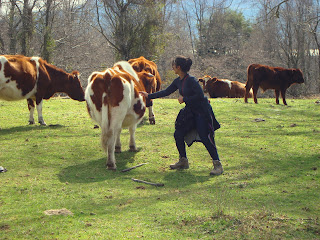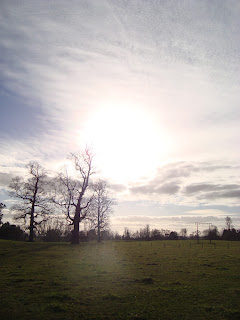 |
| Teenagers dancing the cueca. |
Chile's Independence Day was on the 18th of September, which somehow meant schools would be closed for the entire week.
Día de la Patria, or simply the
dieciocho (18th), is celebrated by gorging on massive amounts of meat,
empañadas, and other yummy goods; dancing the
cueca, Chile's national dance; wearing the national clothes; drinking fermented apple or grape juice called
chicha, and other Chilean drinks; and living it up Chilean style. There is a month-long buildup to the 18, with people practicing the
cueca,
cueca music blaring out of stereos, and stores and stalls selling an abundance of clothes and accessories. Every household is required to show its patriotism by displaying the Chilean flag. If the flag isn't taped to the window or hung in or around their home, the homeowners get fined—or so I've heard.
 |
| Bahía Inglesa, near Copiapó. |
For my
fiestas patrias vacation, I first went to Copiapó, a city in the Atacama desert, the driest
desert in the world. I attended my first
asado, or BBQ, in Chile. Since I don't eat
meat, I grilled veggies smothered with teriyaki sauce. Chilean food generally
lacks spice so much that at least 3 people said the teriyaki sauce was
spicy. I don't know what they would do if they tried wasabi!
 |
| Our take on Mexican food. |
On Monday, we headed off to Coquimbo to celebrate the 18 in style. Upon our arrival, we found out that almost everything would be closed for
the next few days, including banks and supermarkets. ATM machines had
run out of money in several areas in Chile. One store owner gave us the hours for her grocery store, but whenever we went by at those hours, the
almacén
was closed. For three days, we
walked from one grocery store to another in the hopes that something would
be open so we would be able to consume more than salt and water. Thankfully the stores in the neighborhood did open sporadically and we were able to prepare feasts with the few ingredients we could find.
 |
| The biggest fonda was at the Pampilla. |
On the 18th, we put on our red, white, and
blue clothes and headed out to the Pampilla, the biggest
fonda in Chile.
Fondas are essentially state fairs, with stalls after stalls of
food, drinks, games, clothes, and other goods. Later that night and at other points during the trip, we not only danced the
cueca,
but also a myriad of Latin American dances. What I really appreciate about living abroad is discovering how the people of that nation know so much about their neighboring countries and the world. With a universally shared love for music, dance, food, and good company, we are more similar than different. Forget trying to create a dialogue, maybe we should throw a dance party for conflicting groups to settle their disputes.

Our next adventure was at El Valle de Elqui, which is famous for
producing pisco, Chile's unofficial national alcoholic drink. As we
were on vacation, we decided to shed our American tendency to rush and
embraced Chilean time. We woke up late, headed out the door after noon,
enjoyed a slow lunch in a hut-like restaurant, and happily walked through Pisco Elqui with
our artisanal ice cream in hand. By the time we decided to get our act
together and go on a pisco tour, we had missed the last one heading out
of the town. We then decided to head back to Coquimbo by walking along the
highway into the next town to take the bus. On our stroll we came upon a sign for a pisco tour by another company—we had missed the ultimate last tour of the day by minutes.
 |
| View of volcanoes on my flight back to Osorno. |
I haven't figured out how to incorporate Chilean time into my life but still
get things done. On my trip home, I got held up at a restaurant (food took forever to arrive, bill took even longer) and ran to the security gate when I was supposed to be boarding the plane. Once I got there, I was told that the security gate hadn't yet opened for my
flight even though it was supposed to take off in 20 minutes. Now you're probably thinking that I should accept
this tendency for the transportation system to start off a journey late
and take my time getting places. But when I do that, I miss
pisco tours and I nearly missed a bus once. My friends and I had to run after the bus as
it was exiting the bus terminal. It barely stopped for us as it sped
away.
Hopefully by the time I leave Chile, I'll understand how to be late without being late. Until then I'm going to arrive early just in case.

































